Ditapis dengan

Impact of Maritime Labour Convention on design of new ships
Abstract Purpose – The Maritime Labour Convention (MLC) embodies standards of existing international maritime labour conventions and recommendations, as well as the fundamental principles to be found in other international labour conventions. The aim of the convention is to address the employment standards of seafarers in the areas of fair wages, contractual terms, working and living condit…
- Edisi
- Maritime Business Review
- ISBN/ISSN
- -
- Deskripsi Fisik
- 14 halaman
- Judul Seri
- Impact of Maritime Labour Convention on design of new ships
- No. Panggil
- ATC PO HWA a
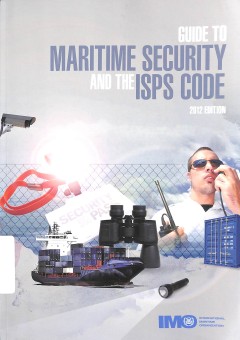
Guide to maritime security and the ISPS code
This guide is intended to provide consolidated guidance on the implementation of the security related amendments to the International Convention on the Safety of Life at Sea, 1974 (SOLAS Convention) which were adopted in December 2002. These amendments included a new chapter XI-2 in the SOLAS Convention, "Special measures to enhance maritime security", which enshrined the International Ship and…
- Edisi
- 2012 Ed.
- ISBN/ISSN
- 978-92-801-1544-4
- Deskripsi Fisik
- xv, 369 p., 33 cm
- Judul Seri
- -
- No. Panggil
- REF MR IMO g
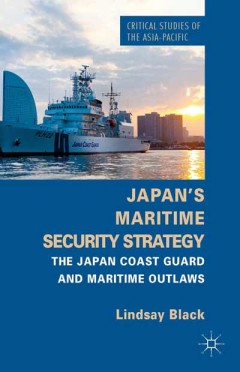
Japan’s maritime security strategy : the japan guard and maritime otlaws
- Edisi
- -
- ISBN/ISSN
- 978-1-137-38555-0
- Deskripsi Fisik
- xii, 221 p.
- Judul Seri
- -
- No. Panggil
- TXT MR BLA j
- Edisi
- -
- ISBN/ISSN
- 978-1-137-38555-0
- Deskripsi Fisik
- xii, 221 p.
- Judul Seri
- -
- No. Panggil
- TXT MR BLA j
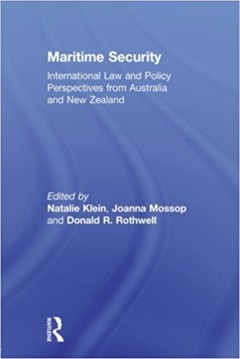
Maritime security : international law and policy perspectives from australia …
- Edisi
- -
- ISBN/ISSN
- 978-0-203-86747-1
- Deskripsi Fisik
- xxiv, 277 p.
- Judul Seri
- -
- No. Panggil
- TXT MR ROT m
- Edisi
- -
- ISBN/ISSN
- 978-0-203-86747-1
- Deskripsi Fisik
- xxiv, 277 p.
- Judul Seri
- -
- No. Panggil
- TXT MR ROT m
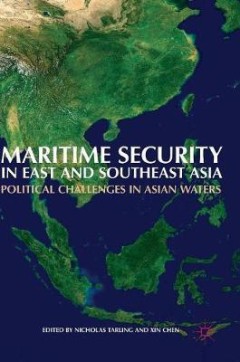
Maritime security in east and southeast asia : political challenges in asian …
- Edisi
- -
- ISBN/ISSN
- 978-981-10-2588-4
- Deskripsi Fisik
- xiii, 254 p.
- Judul Seri
- -
- No. Panggil
- TXT MR TAR m
- Edisi
- -
- ISBN/ISSN
- 978-981-10-2588-4
- Deskripsi Fisik
- xiii, 254 p.
- Judul Seri
- -
- No. Panggil
- TXT MR TAR m
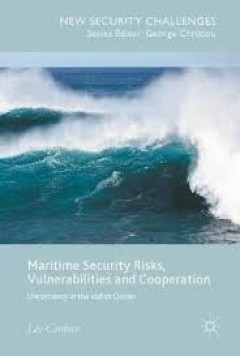
Maritime security risks, vulnerabilities and cooperation : uncertanily in the…
- Edisi
- -
- ISBN/ISSN
- 978-3-319-62755-7
- Deskripsi Fisik
- xiii, 281 p.
- Judul Seri
- -
- No. Panggil
- TXT MR COR m
- Edisi
- -
- ISBN/ISSN
- 978-3-319-62755-7
- Deskripsi Fisik
- xiii, 281 p.
- Judul Seri
- -
- No. Panggil
- TXT MR COR m
Maritime Security: Protection of Marinas, Ports, Small Watercraft, Yachts, an…
With the majority of the surface of the globe being water, most of the cargo that is shipped to, or from, the United States as well as other countries is accomplished by the maritime community, which is the economic lifeline of the country. The security of the maritime industry is vital to its continued operation and national security, which is the reason for writing this book. The threat to th…
- Edisi
- -
- ISBN/ISSN
- 978-1-4987-0661-2
- Deskripsi Fisik
- xxv, 233 p
- Judul Seri
- -
- No. Panggil
- TXT MR BEN m
Between the Devil and the Deep: Meeting Challenges in the Public Interpretat…
- Edisi
- -
- ISBN/ISSN
- 978-1-4614-8178-2
- Deskripsi Fisik
- ix, 209 p
- Judul Seri
- -
- No. Panggil
- TXT MR DEL b
- Edisi
- -
- ISBN/ISSN
- 978-1-4614-8178-2
- Deskripsi Fisik
- ix, 209 p
- Judul Seri
- -
- No. Panggil
- TXT MR DEL b

Non-traditional Maritime Security Threats in the Indian Ocean Region
The Indian Ocean Region (IOR) has emerged as the world’s major energy and trade route. The IOR littorals are concerned about the vulnerabilities in the region due to various nontraditional maritime security threats such as piracy, maritime terrorism, climate change, illegal, unreported and unregulated (IUU) fishing, illegal immigration, and smuggling of arms and drugs. This paper analyses…
- Edisi
- Vol. 10 No. 2
- ISBN/ISSN
- 1946-6609
- Deskripsi Fisik
- 20 p
- Judul Seri
- Maritime Affairs: Journal of the National Maritime Foundation of India
- No. Panggil
- ATC MR CHA n

German Maritime Security Governance: A Perspective on The Indian Ocean Region
Besides the high number of attacks by Somali pirates, terrorists have threatened to disrupt Western maritime trade and oil and gas supplies in the Indian Ocean Region. This case study of German maritime security governance aims to examine these threats faced by Germany, and German countermeasures and preparedness. The German economy relies heavily on its international sea trade and Germany is h…
- Edisi
- Vol. 8, No. 2
- ISBN/ISSN
- 1948-108X
- Deskripsi Fisik
- 24 p
- Judul Seri
- Journal of the Indian Ocean Region
- No. Panggil
- ATC MR SCH g

Harnessing Opportunities and Overcoming Challenges: Maritime Security in the …
- Edisi
- Vol. 39, No. 4
- ISBN/ISSN
- 1754-0054
- Deskripsi Fisik
- 16 p
- Judul Seri
- Strategic Analysis
- No. Panggil
- ATC MR IND h
- Edisi
- Vol. 39, No. 4
- ISBN/ISSN
- 1754-0054
- Deskripsi Fisik
- 16 p
- Judul Seri
- Strategic Analysis
- No. Panggil
- ATC MR IND h

Maritime security in the Asia-Pacific : China and the emerging order in the …
Asia’s maritime security environment has deteriorated since 2009, amid an increasingly illtempered discourse over competing historical and legal claims to sovereignty over maritime territories. Disputes have escalated into tit-for-tat actions at sea that have included navalskirmishes and provocative land reclamation projects.
- Edisi
- -
- ISBN/ISSN
- -
- Deskripsi Fisik
- 32 p.
- Judul Seri
- -
- No. Panggil
- ATC MR LIN m

Maritime interdiction in Sri Lanka's counterinsurgency
A comprehensive maritime interdiction strategy to attack the insurgent’s logistic system was a key element in the defeat of the Tamil Tigers. The campaign of maritime interdiction required the Sri Lankan Navy (SLN) to attack LTTE arms smuggling, sea piracy, and maritime terrorism. The SLN degraded the insurgency’s robust maritime logistical network while also devising tactics to engage the …
- Edisi
- -
- ISBN/ISSN
- 0959-2318
- Deskripsi Fisik
- 20 p.
- Judul Seri
- -
- No. Panggil
- ATC MR SMI m

Contractors as a Second Best Option: The Italian Hybrid Approach to Maritime …
Initially based mainly on the use of Navy Vessel Protection Detachments (VPDs) paid by shipowners, Italian maritime security legislation also allows for the use of Privately Contracted Armed Security Personnel (PCASP) when VPDs are not available. Hence, Italy has adopted a hybrid antipiracy approach that entails two different forms of private sector involvement: the financing and partial contro…
- Edisi
- -
- ISBN/ISSN
- 1521-0642
- Deskripsi Fisik
- 13 p
- Judul Seri
- Ocean Development & International Law
- No. Panggil
- ATC MR CUS c
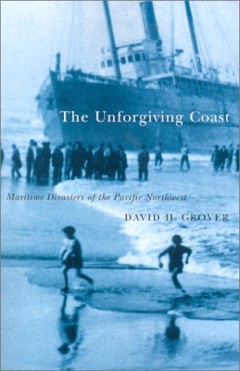
The Unforgiving Coast: MARITIME DISASTERS OF THE PACIFIC NORTHWEST
- Edisi
- -
- ISBN/ISSN
- 0-87071-541-0
- Deskripsi Fisik
- x, 215 p
- Judul Seri
- -
- No. Panggil
- TXT MR GRO t
- Edisi
- -
- ISBN/ISSN
- 0-87071-541-0
- Deskripsi Fisik
- x, 215 p
- Judul Seri
- -
- No. Panggil
- TXT MR GRO t
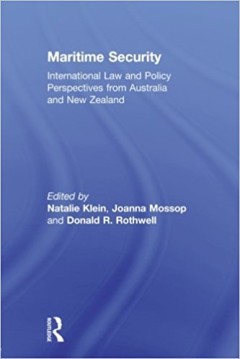
Maritime Security: International Law and Policy Perspectives from Australia a…
- Edisi
- -
- ISBN/ISSN
- 978–0–203–86747–1
- Deskripsi Fisik
- xxiv, 280 p
- Judul Seri
- -
- No. Panggil
- TXT MR KLE m
- Edisi
- -
- ISBN/ISSN
- 978–0–203–86747–1
- Deskripsi Fisik
- xxiv, 280 p
- Judul Seri
- -
- No. Panggil
- TXT MR KLE m
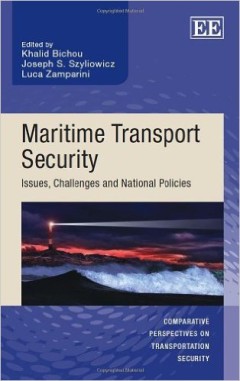
Maritime Transport Security : Issues, Challenges and National Policies
This important book presents a profound analysis of the current challenges and policies related to the growing concern of maritime transport security, covering all aspects, from terrorism, in general, to piracy, in particular. It is a comprehensive work that offers a multidisciplinary view on the main themes and issues in this relatively unexplored field. It also provides several case studies t…
- Edisi
- -
- ISBN/ISSN
- 978-1-78195-496-6
- Deskripsi Fisik
- viii, 299 p, 21 cm
- Judul Seri
- -
- No. Panggil
- TXT MR KHA m

Maritime and Port Security
- Edisi
- -
- ISBN/ISSN
- -
- Deskripsi Fisik
- -
- Judul Seri
- -
- No. Panggil
- ATC MR GOS m
- Edisi
- -
- ISBN/ISSN
- -
- Deskripsi Fisik
- -
- Judul Seri
- -
- No. Panggil
- ATC MR GOS m

Maritime security and threats to energy transportation in Southeast Asia
Southeast Asia contains some of the world’s busiest and most strategic chokepoints for maritime commerce, making it a sub-region of global strategic interest. Yet the vital energy shipments through the region are subject to potential disruption caused by maritime safety challenges, legal-passage regimes, piracy and terrorism, and inter-state conflict. In addition, potential counter-trends cou…
- Edisi
- VOL. 160 NO.2pp. 20–31
- ISBN/ISSN
- -
- Deskripsi Fisik
- 13 p.
- Judul Seri
- -
- No. Panggil
- ATC MR GRA m

Fault Lines In Maritime Security
The maritime domain of the Gulf of Guinea presents enormous opportunities for enhancing socio-economic development and human security in the region. However, there are increasing maritime security threats that affect the exploitation of coastal resources, the peaceful use of sea lines of communication as well as the stability of littoral states along the Gulf of Guinea. Dealing with these t…
- Edisi
- -
- ISBN/ISSN
- 2154-0128
- Deskripsi Fisik
- 17 p
- Judul Seri
- African Security Review
- No. Panggil
- ATC MR ALI f

Energy Transit States and Maritime Security In The Malacca Strait: The Case o…
This paper critically evaluates the role that Singapore plays in regional maritime security in Southeast Asia. It demonstrates that although the Malacca Strait’s littoral states notionally have a common interest in maritime security politics, competition as well as cooperation has been a hallmark of Singapore’s approach. To explain this, we offer a conceptual extension to the emerging sc…
- Edisi
- Vol. 4
- ISBN/ISSN
- 2333-6498
- Deskripsi Fisik
- 13 p
- Judul Seri
- Australian Journal of Maritime & Ocean Affairs
- No. Panggil
- ATC MR CAS e
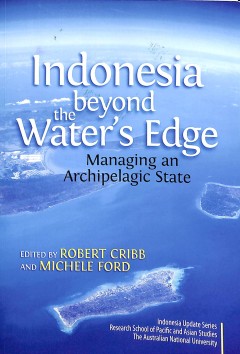
Indonesia beyond the water's edge : managing an archipelagic state
Indonesia is the world's largest archipelagic state, with more than 18,000 islands and over 7.9 million square kilometres of sea. The marine frontier presents the nation with both economic opportunities and political and strategic challenges. Indonesia has been affected more than most countries in the world by a slow revolution in the management of its waters. Whereas Indonesia's seas were once…
- Edisi
- -
- ISBN/ISSN
- 978-981-230-984-6
- Deskripsi Fisik
- xiii, 247 p., ; illus : 24 cm ; index
- Judul Seri
- -
- No. Panggil
- LC 341.4 CRI i
 Karya Umum
Karya Umum  Filsafat
Filsafat  Agama
Agama  Ilmu-ilmu Sosial
Ilmu-ilmu Sosial  Bahasa
Bahasa  Ilmu-ilmu Murni
Ilmu-ilmu Murni  Ilmu-ilmu Terapan
Ilmu-ilmu Terapan  Kesenian, Hiburan, dan Olahraga
Kesenian, Hiburan, dan Olahraga  Kesusastraan
Kesusastraan  Geografi dan Sejarah
Geografi dan Sejarah